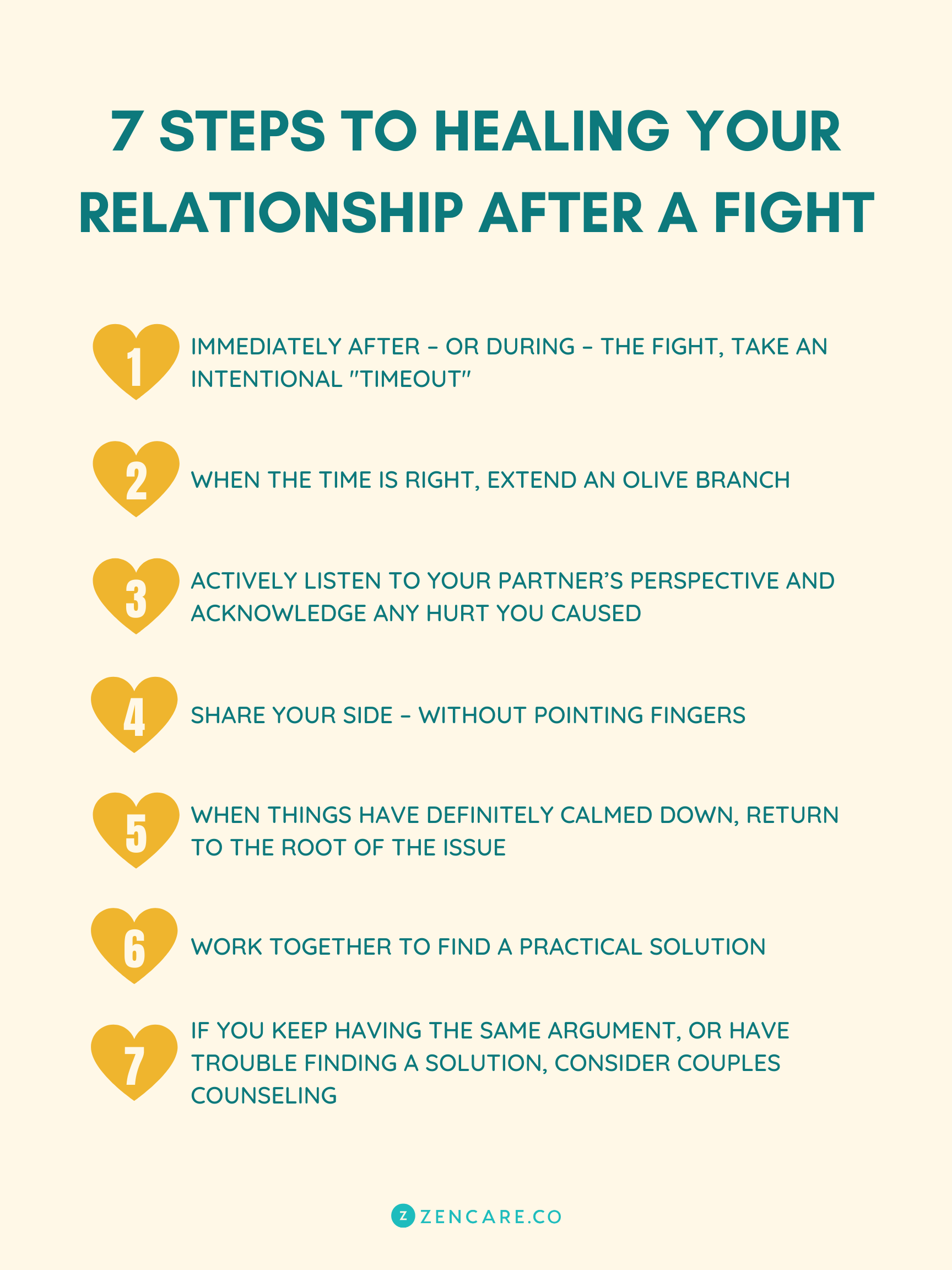While you may not like to argue with your significant other, it probably happens sometimes. You may know couples who argue often and those who don’t. But there are several reasons why arguing may be good for your relationship.
The occasional argument is actually a good thing. When couples fight, it means they care about the relationship. When fighting goes away completely, sometimes one or both people have checked out. Not fighting with your partner may indicate a different issue—perhaps you’re weary to share your true feelings, or you don’t trust your partner to handle your feelings.
So, instead of focusing on how often you fight as a couple, think about how fairly you fight. Read on to discover 11 tips to help you fight more productively.
1. Pause…before you blurt out something hurtful.
When you’re in the heat of the moment and feeling emotional, it’s tough to think before you open your mouth. A few simple seconds give you enough time to step back from the argument and think: “How can I say this so my partner will hear it?” This quick, mental timeout will help you choose a kinder and calmer way to approach the situation, and make you more likely to be heard as a result.
2. Speak in “I” rather than “you” phrases.
Saying “I’m hurt” or “I feel really angry” instead of “You screwed up!” will lead to a more productive dialogue because it takes your partner off of the defensive. Speaking in terms of how you feel and offering potential solutions to try together, rather than blaming your partner completely, will remind you that you’re in a partnership and need to work together to have a stronger relationship.
3. Avoid character assaults.
Unfortunately, arguments can often devolve into personal attacks (think name-calling, criticizing the core of who someone is or how they look)—and that is definitely not healthy for your relationship. If you’re name-calling, you’ve probably gone too far.
4. Instead, focus on the actual issue.
If you’re constantly rehashing old arguments, fighting about the same things over and over with no resolution or compromise, or feeling upset about the fact that you’re fighting all the time, that can become problematic.
So, instead of saying, “Of course, you didn’t do the dishes again. You’re lazy!”—which will either put your partner on the defense or make him retreat or resent you—try isolating the specific complaint or issue you have. You can say something instead like, “I feel frustrated when I come home to a sink full of dirty dishes. Can we set up a schedule for our chores so this doesn’t happen again?”
5. Listen more and talk less.
When we’re arguing, there’s a tendency to talk more than to listen. We’re so eager to get our feelings out, we may not even hear what our loved one is trying to express. The person who has an issue is the one that needs to be listened to. Instead of immediately defending yourself, just listen and let your partner know that you heard them.
This approach is effective because it shows that you were listening and understanding what your partner was saying or where they were coming from. You’re more likely to have a more productive dialogue instead of a full blowout argument when you just listen.
6. Change what you say—and how you say it.
The reality is that most of us recycle arguments and can almost exactly predict how our partner is going to respond as if the discussion has been scripted. Instead of pointing the finger at the other person, they can ask themselves how they’re contributing to the argument and try a new approach. The critical piece is that you frame your argument with respect and kindness so that you give your loved one a chance to respond in kind.
7. Resist the urge to avoid the argument.
A lot of couples might keep it to themselves when they’re mad at each other because they’re scared of starting potentially relationship-threatening arguments. If you don’t talk out problems, you tend to act them out — and as a result, problems not only persist, they actually get worse. The biggest mistake is to fool yourself into thinking that *not *talking about concerns reduces the risk of problems—it doesn’t.
8. Put yourself in your partner’s shoes.
Another key tip for addressing relationship issues effectively? Put yourself in your partner’s shoes by brainstorming reasons why a sensible person might behave the way they did. It will help you better understand their actions.
9. Don’t threaten to leave your significant other.
It’s easy to let your emotions get the best of you but try as hard as you can not threaten to break up or get divorced. Regardless of whether you mean it, those words can leave a lasting impact on the person who hears them and cause them to feel insecure in the relationship long after the fight is over.
10. Never resort to physical or emotional abuse.
If a fight with your partner has ever made you feel physical, emotionally, or psychologically unsafe, that’s a major red flag, according to the experts. Couples fighting is healthy only as long as it stays fair and safe.
If you find that you’re arguing a lot, it’s bothering you, and the two of you can’t seem to get it right, it may be time to see a professional for help. Often a clean pair of eyes can help you see where your communication patterns are going wrong. And if you feel like things have crossed a line, talk to a family therapist, couples counselor, or someone you trust ASAP.

